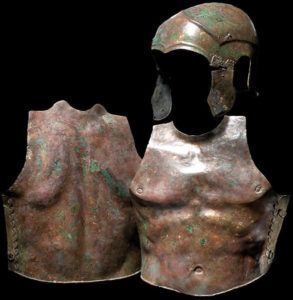Soul Armor – Part 3
 Do not be anxious about anything, but in everything, by prayer and petition, with thanksgiving, present your requests to God. And the peace of God, which transcends all understanding, will guard your hearts and your minds in Christ Jesus. Philippians 4:6-7
Do not be anxious about anything, but in everything, by prayer and petition, with thanksgiving, present your requests to God. And the peace of God, which transcends all understanding, will guard your hearts and your minds in Christ Jesus. Philippians 4:6-7- of divine origin,
- superior over the seat of our personality (intellect & emotions)
- able to protect both our head and heart!
Soul Armor – Part 2

Do not be anxious about anything … Philippians 4:6
- “not be anxious” (NIV) or
- “not worry” (several other translations) or
- “be careful for nothing” (KJV)?
Soul Armor – Part 1
 According to a report entitled, “The State of Mental Health in America –2017,” access to mental health care has increased, but so have mental health issues. Depression rates in youth continue to rise year after year. The report estimates that one in five U.S. citizens have some level of mental health condition. The study decries the lack of professionals (psychiatrists, psychologists, social workers, counselors, and psychiatric nurses) reporting that the least resourced state has an average of only one mental health professional per 1000 citizens. If we take that lowest rate of coverage against the U.S. population, that means there are at least 321,400 mental health professionals in the U.S. That outnumbers churches! It also outnumbers mental health professionals in every region of the world with the exclusion of Europe. With such abundant resources, why aren’t we in better mental shape?
According to a report entitled, “The State of Mental Health in America –2017,” access to mental health care has increased, but so have mental health issues. Depression rates in youth continue to rise year after year. The report estimates that one in five U.S. citizens have some level of mental health condition. The study decries the lack of professionals (psychiatrists, psychologists, social workers, counselors, and psychiatric nurses) reporting that the least resourced state has an average of only one mental health professional per 1000 citizens. If we take that lowest rate of coverage against the U.S. population, that means there are at least 321,400 mental health professionals in the U.S. That outnumbers churches! It also outnumbers mental health professionals in every region of the world with the exclusion of Europe. With such abundant resources, why aren’t we in better mental shape?Pyrotechnic Praise

“I pledge allegiance to … what?”

History is simple when you’re a child, but Betsy Ross did not stitch the first U.S. flag. Our first official pennant as a newly founded nation was stitched together by soldiers at Fort Stanwix, New York on August 3rd, 1777. They gave up their shirts for the white stripes and stars; the officer’s wives gave up red flannel from their petticoats; and Captain Abraham Swartwout sacrificed his coat for the sea of blue. Congress paid Capt. Swartwout for his coat … our nation still has the receipt. The exact design of that flag is lost to history, but it probably resembled the Serapis Flag hastily constructed for John Paul Jones during the 1779 Battle of Flamborough Head. Similar designs were seriously considered for the U.S. flag.
 er Pearson would have had his way, a strikingly different flag would be flying over Canada. It took the examination of almost 5,900 suggested designs and 308 speeches in the House of Commons to resolve the “Great Flag Debate.” Queen Elizabeth the Second proclaimed the current red and white maple leaf design on January 28, 1965. Had they chosen Pearson’s Pennant, the inaugural crowd still would have sung “O Canada” and “God Save the Queen.”
er Pearson would have had his way, a strikingly different flag would be flying over Canada. It took the examination of almost 5,900 suggested designs and 308 speeches in the House of Commons to resolve the “Great Flag Debate.” Queen Elizabeth the Second proclaimed the current red and white maple leaf design on January 28, 1965. Had they chosen Pearson’s Pennant, the inaugural crowd still would have sung “O Canada” and “God Save the Queen.”
